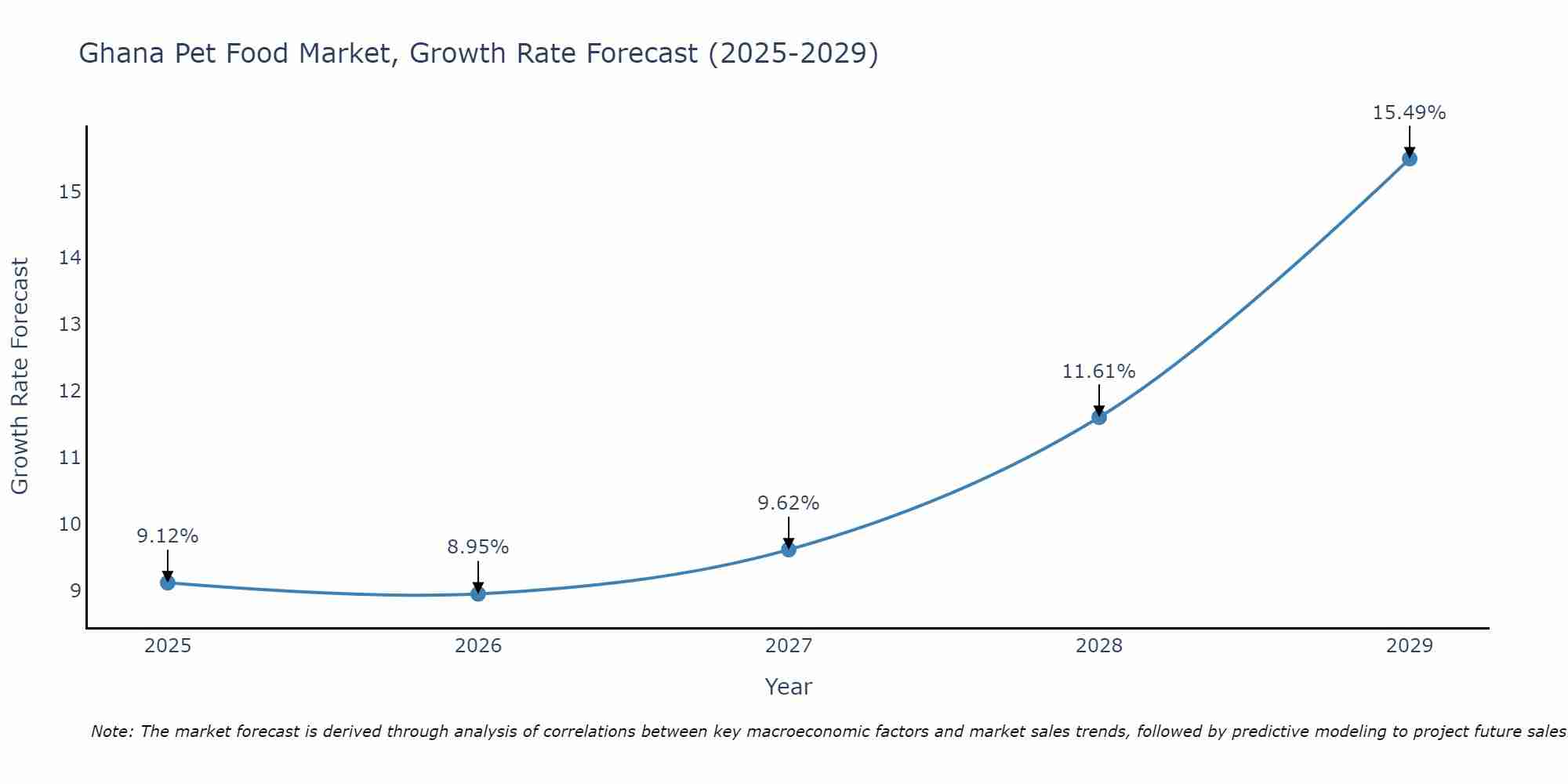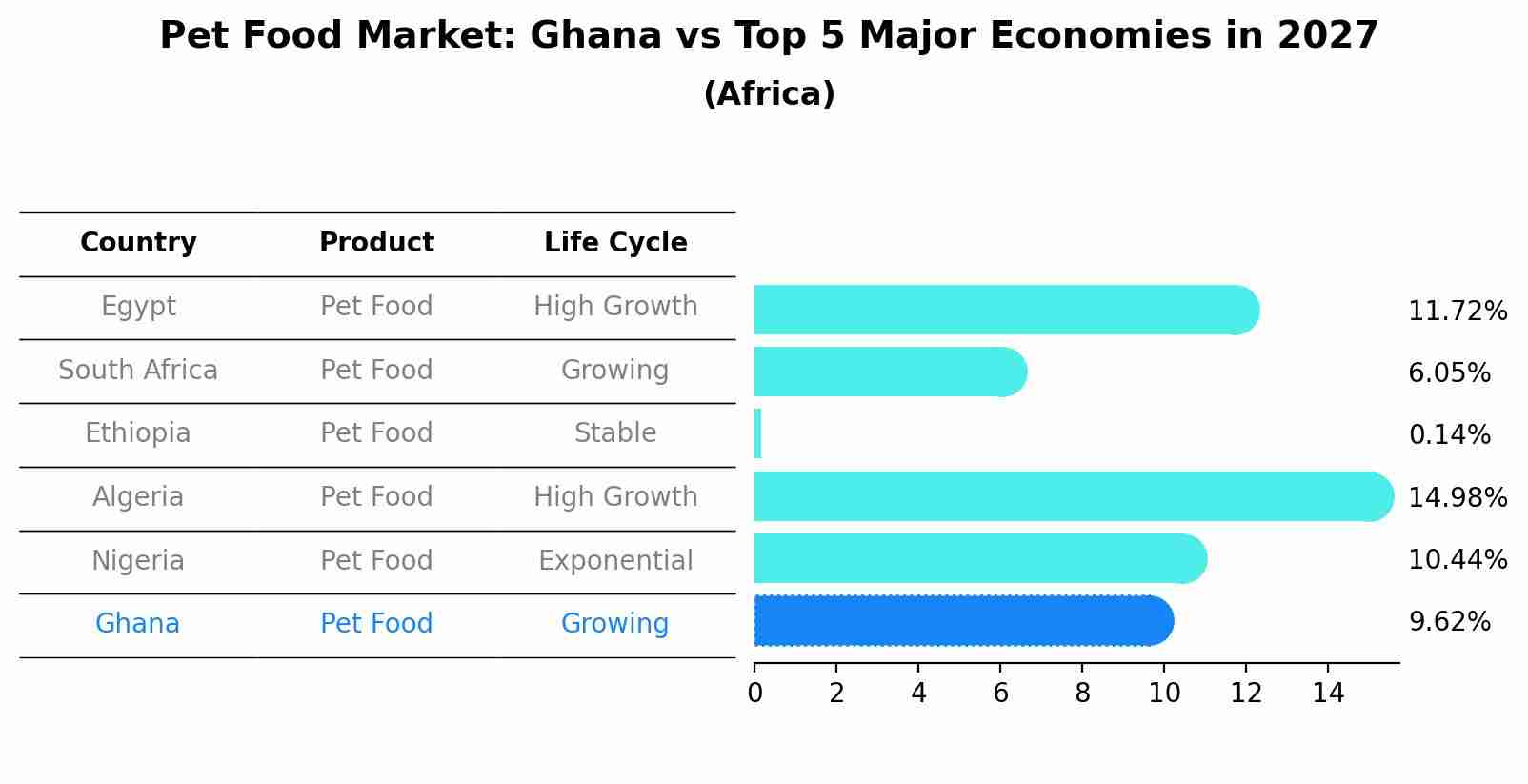Ghana Pet Food Market (2025-2031) Outlook | Share, Companies, Value, Revenue, Size, Forecast, Industry, Growth, Analysis & Trends
| Product Code: ETC383936 | Publication Date: Aug 2022 | Updated Date: Jul 2025 | Product Type: Market Research Report | |
| Publisher: 6Wresearch | Author: Summon Dutta | No. of Pages: 75 | No. of Figures: 35 | No. of Tables: 20 |
Ghana Pet Food Market Size Growth Rate
The Ghana Pet Food Market is projected to witness mixed growth rate patterns during 2025 to 2029. From 9.12% in 2025, the growth rate steadily ascends to 15.49% in 2029.

Pet Food Market: Ghana vs Top 5 Major Economies in 2027 (Africa)
By 2027, the Pet Food market in Ghana is anticipated to reach a growth rate of 9.62%, as part of an increasingly competitive Africa region, where Egypt remains at the forefront, supported by South Africa, Ethiopia, Algeria and Nigeria, driving innovations and market adoption across sectors.

Ghana Pet Food Market Synopsis
The Ghana Pet Food Market is experiencing steady growth driven by increasing pet ownership, urbanization, and rising disposable incomes. The market is primarily dominated by dry pet food products due to their convenience and longer shelf life. However, there is a growing demand for premium and organic pet food products as pet owners become more conscious of their pets` health and well-being. Key players in the Ghanaian pet food market include international brands like Pedigree, Royal Canin, and local manufacturers catering to different price segments. Distribution channels such as pet stores, supermarkets, and online platforms are crucial in reaching a wide consumer base. With a growing pet population and changing consumer preferences, the Ghana Pet Food Market presents opportunities for innovation and diversification in product offerings to meet the evolving needs of pet owners.
Ghana Pet Food Market Trends
The pet food market in Ghana is experiencing a shift towards premium and specialized products, driven by an increasing awareness of pet health and nutrition. Consumers are increasingly seeking high-quality, natural ingredients, and specific formulations tailored to their pets` needs, such as grain-free, organic, and hypoallergenic options. There is also a growing demand for convenience and on-the-go pet food solutions, such as single-serve packs and ready-to-eat meals. E-commerce is playing an increasingly important role in the distribution of pet food, providing consumers with a wider range of products and convenient delivery options. Overall, the Ghanaian pet food market is witnessing a trend towards premiumization and customization to meet the evolving preferences and needs of pet owners.
Ghana Pet Food Market Challenges
One of the main challenges faced in the Ghana Pet Food Market is the relatively low level of awareness and understanding of the importance of pet nutrition among local consumers. This lack of awareness often leads to a preference for lower-quality, cheaper pet food options, which can have a negative impact on the health and well-being of pets. Additionally, limited availability of premium pet food brands and products in the market further complicates the situation. Distribution and logistics issues also contribute to challenges in reaching a wider audience of pet owners. Overall, educating consumers about the benefits of high-quality pet food, improving distribution networks, and increasing the variety of products available are key areas that need to be addressed to drive growth in the Ghana Pet Food Market.
Ghana Pet Food Market Investment Opportunities
The Ghana Pet Food Market presents promising investment opportunities due to the increasing pet ownership rates and rising disposable incomes in the country. With a growing awareness of pet health and nutrition, there is a growing demand for high-quality pet food products, including premium and specialized options. Investors can explore opportunities in manufacturing or distributing a wide range of pet food products such as dry kibble, wet food, treats, and supplements tailored to meet the specific dietary needs of pets. Additionally, there is potential for innovation in packaging, marketing, and distribution channels to cater to the evolving preferences of Ghanaian pet owners. Overall, investing in the Ghana Pet Food Market offers a chance to capitalize on a developing industry driven by the growing pet humanization trend and changing consumer preferences.
Jordan Agar Market Government Policies
The Ghanaian government does not have specific policies or regulations directly targeting the pet food market. However, the industry is subject to general food safety and quality regulations enforced by the Food and Drugs Authority (FDA) to ensure products meet required standards. Additionally, importation of pet food is governed by the Ghana Standards Authority (GSA) to ensure compliance with international standards. The government also collaborates with industry stakeholders to promote local manufacturing of pet food and enhance food security. Overall, while there are no specific policies exclusively for the pet food market, the government`s efforts focus on ensuring that all food products, including pet food, meet quality standards and are safe for consumption within the country.
Ghana Pet Food Market Future Outlook
The future outlook for the Ghana Pet Food Market appears promising, driven by factors such as increasing urbanization, rising disposable incomes, and a growing awareness of pet health and nutrition. As more Ghanaians adopt pets and seek high-quality pet food products, the demand for premium and specialized pet food is expected to grow. Additionally, the trend towards humanization of pets is likely to drive the demand for organic, natural, and functional pet food options. Market players are anticipated to introduce innovative products tailored to meet the specific dietary needs of different pet species, contributing to market expansion. However, challenges such as price sensitivity and limited distribution networks in rural areas may impact market growth. Overall, the Ghana Pet Food Market is expected to witness steady growth in the coming years, presenting opportunities for both domestic and international pet food manufacturers.
Key Highlights of the Report:
- Ghana Pet Food Market Outlook
- Market Size of Ghana Pet Food Market, 2024
- Forecast of Ghana Pet Food Market, 2031
- Historical Data and Forecast of Ghana Pet Food Revenues & Volume for the Period 2021 - 2031
- Ghana Pet Food Market Trend Evolution
- Ghana Pet Food Market Drivers and Challenges
- Ghana Pet Food Price Trends
- Ghana Pet Food Porter's Five Forces
- Ghana Pet Food Industry Life Cycle
- Historical Data and Forecast of Ghana Pet Food Market Revenues & Volume By Type for the Period 2021 - 2031
- Historical Data and Forecast of Ghana Pet Food Market Revenues & Volume By Dry Food for the Period 2021 - 2031
- Historical Data and Forecast of Ghana Pet Food Market Revenues & Volume By Wet Food for the Period 2021 - 2031
- Historical Data and Forecast of Ghana Pet Food Market Revenues & Volume By Snacks/Treats for the Period 2021 - 2031
- Historical Data and Forecast of Ghana Pet Food Market Revenues & Volume By Animal for the Period 2021 - 2031
- Historical Data and Forecast of Ghana Pet Food Market Revenues & Volume By Dog for the Period 2021 - 2031
- Historical Data and Forecast of Ghana Pet Food Market Revenues & Volume By Cat for the Period 2021 - 2031
- Historical Data and Forecast of Ghana Pet Food Market Revenues & Volume By Others for the Period 2021 - 2031
- Ghana Pet Food Import Export Trade Statistics
- Market Opportunity Assessment By Type
- Market Opportunity Assessment By Animal
- Ghana Pet Food Top Companies Market Share
- Ghana Pet Food Competitive Benchmarking By Technical and Operational Parameters
- Ghana Pet Food Company Profiles
- Ghana Pet Food Key Strategic Recommendations
Frequently Asked Questions About the Market Study (FAQs):
- Single User License$ 1,995
- Department License$ 2,400
- Site License$ 3,120
- Global License$ 3,795
Search
Thought Leadership and Analyst Meet
Our Clients
Related Reports
- Afghanistan Rocking Chairs And Adirondack Chairs Market (2026-2032) | Size & Revenue, Competitive Landscape, Share, Segmentation, Industry, Value, Outlook, Analysis, Trends, Growth, Forecast, Companies
- Afghanistan Apparel Market (2026-2032) | Growth, Outlook, Industry, Segmentation, Forecast, Size, Companies, Trends, Value, Share, Analysis & Revenue
- Canada Oil and Gas Market (2026-2032) | Share, Segmentation, Value, Industry, Trends, Forecast, Analysis, Size & Revenue, Growth, Competitive Landscape, Outlook, Companies
- Germany Breakfast Food Market (2026-2032) | Industry, Share, Growth, Size, Companies, Value, Analysis, Revenue, Trends, Forecast & Outlook
- Australia Briquette Market (2025-2031) | Growth, Size, Revenue, Forecast, Analysis, Trends, Value, Share, Industry & Companies
- Vietnam System Integrator Market (2025-2031) | Size, Companies, Analysis, Industry, Value, Forecast, Growth, Trends, Revenue & Share
- ASEAN and Thailand Brain Health Supplements Market (2025-2031) | Strategy, Consumer Insights, Analysis, Investment Trends, Opportunities, Growth, Size, Share, Industry, Revenue, Segments, Value, Segmentation, Supply, Forecast, Restraints, Outlook, Competition, Drivers, Trends, Demand, Pricing Analysis, Competitive, Strategic Insights, Companies, Challenges
- ASEAN Bearings Market (2025-2031) | Strategy, Consumer Insights, Analysis, Investment Trends, Opportunities, Growth, Size, Share, Industry, Revenue, Segments, Value, Segmentation, Supply, Forecast, Restraints, Outlook, Competition, Drivers, Trends, Demand, Pricing Analysis, Competitive, Strategic Insights, Companies, Challenges
- Europe Flooring Market (2025-2031) | Outlook, Share, Industry, Trends, Forecast, Companies, Revenue, Size, Analysis, Growth & Value
- Saudi Arabia Manlift Market (2025-2031) | Outlook, Size, Growth, Trends, Companies, Industry, Revenue, Value, Share, Forecast & Analysis
Industry Events and Analyst Meet
Whitepaper
- Middle East & Africa Commercial Security Market Click here to view more.
- Middle East & Africa Fire Safety Systems & Equipment Market Click here to view more.
- GCC Drone Market Click here to view more.
- Middle East Lighting Fixture Market Click here to view more.
- GCC Physical & Perimeter Security Market Click here to view more.
6WResearch In News
- Doha a strategic location for EV manufacturing hub: IPA Qatar
- Demand for luxury TVs surging in the GCC, says Samsung
- Empowering Growth: The Thriving Journey of Bangladesh’s Cable Industry
- Demand for luxury TVs surging in the GCC, says Samsung
- Video call with a traditional healer? Once unthinkable, it’s now common in South Africa
- Intelligent Buildings To Smooth GCC’s Path To Net Zero


















